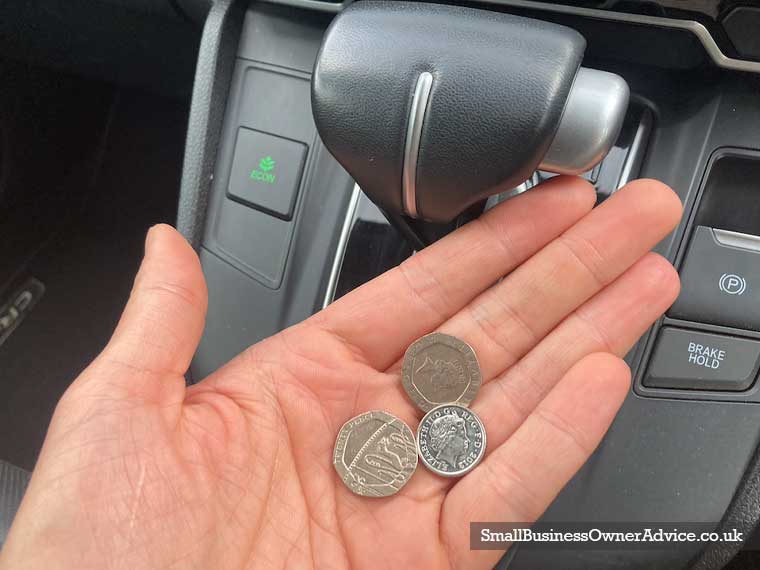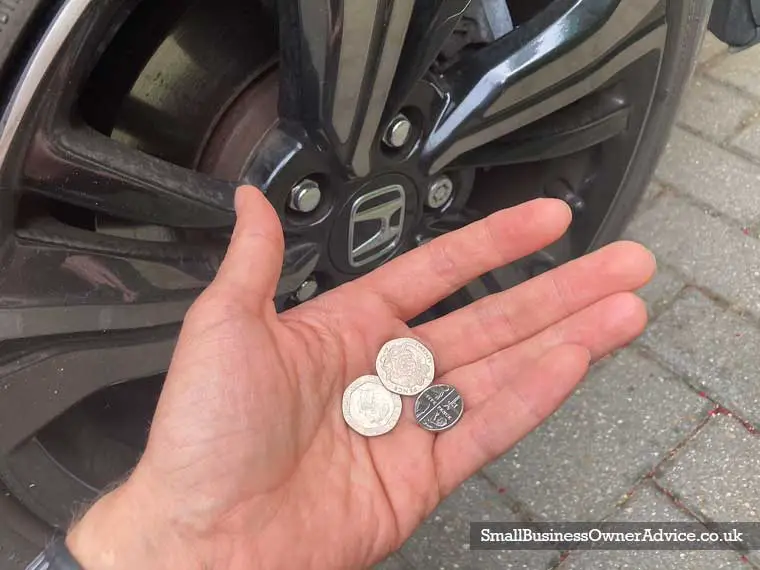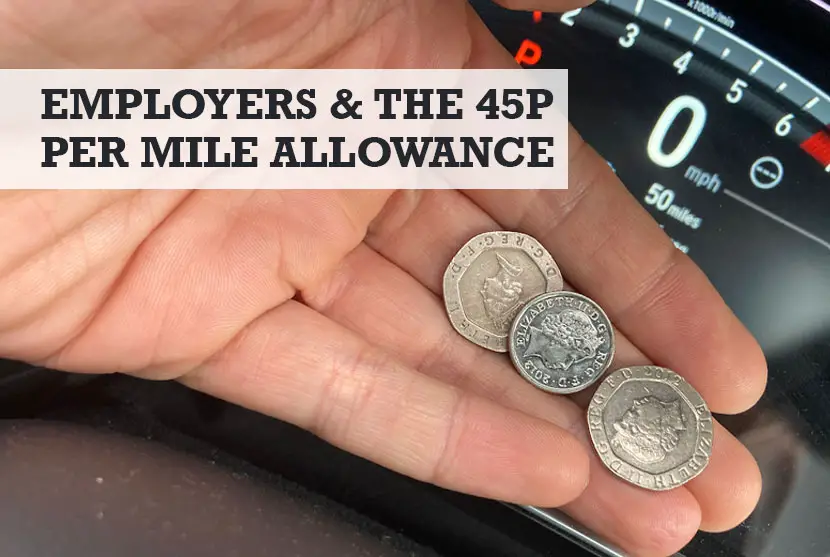Given the rising costs of fuel and living, questions around the 45p mileage rate are a hot topic. Not just for employees, but also employees… everyone is feeling the crunch.
One question we’ve been repeatedly asked this month is from workers as to whether an employer has to pay them mileage. We’ve also had employers on the other side of the fence asking if companies have to pay 45p per mile.
Below is our guide to whether employers have to pay mileage, and if so, if they have to pay the 45p rate or not. We’ve also explained how the 45p rate might need reviewing by the government soon!
Do I have to pay my employee 45p per mile?
Approved mileage rates are set by HMRC and reviewed from time to time. The approved mileage rate is set to cover the use of personal car fuel, wear and tear, insurance, and repairs.
The current rate of 45p is set from the tax year 2011/2012 when the average fuel cost was £126.5p per litre – seems low now doesn’t it?
There seems to be little evidence that this is going to be reviewed soon even though the average price per litre of fuel has increased by 40% since the last update to the approved mileage rate.
Where does that leave the employer and employee?
With inflation rising and the cost of living going through the roof, employees might struggle to afford to keep driving their own car for the company. As employers, could a company pay more per mile?
Do I have to pay my employee 45p per mile? No, companies do not have to pay 45p per mile. If they do pay less than the approved mileage rate set by HMRC, the employee can claim tax relief on the difference through a Self-Assessment tax return.
Paying more will create a benefit in kind, submit a P11D to HMRC and the recipient will pay tax on the difference.
Throughout this article, we will walk you through the different scenarios, so you know what to expect whether you are using your personal car or you have access to a company.

Does my employer have to pay me mileage?
Companies do not have to pay 45p a mile. In fact, an employer is not obliged to pay employees a mileage allowance at all. If you are unsure, we would recommend checking your employment contract or staff handbook.
Sadly, whilst you might expect your employer should pay for your fuel, it’s not actually the case at all.
Why?
It’s because mileage allowance is the most common benefit offered to employees in the UK. The key word here is that it is a benefit. While you are entitled to tax relief on your mileage your employer is not under any obligation to pay for your fuel at any set amount.
But it would be extremely hard for an employer to justify not paying a mileage allowance. Why would any employee choose to drive their own car, incurring additional costs on behalf of the business without any form of compensation for doing so?
If you do fall into this category, we advise you have a re-think.
How much should an employer pay me per mile?
In the UK, Mileage Allowance Payments (MAPs) are what you pay your employee for using their own vehicle for business journeys.
The table below sets out how much an employer should pay you per mile, providing they offer this as a benefit to employees.
| First 10,000 miles | Above 10,000 miles | |
| Cars and vans | 45p | 25p |
| Motorcycles | 24p | 24p |
| Bikes | 20p | 20p |
Fuel Advisory Rates apply to employees using a company car.
Use the rates when you either:
- Reimburse employees for business travel in their company cars.
- Need employees to repay the cost of fuel used for private travel.
From 1 June 2022
| Engine size | Petrol – rate per mile | LPG – rate per mile |
| 1400cc or less | 14p | 9p |
| 1401cc to 2000cc | 17p | 11p |
| Over 2000cc | 25p | 16p |
| Engine size | Diesel – rate per mile |
| 1600cc or less | 13p |
| 1601cc to 2000cc | 16p |
| Over 2000cc | 19p |
Is 45p per mile good enough?
Whether the approved mileage rate of 45p per mile is good or not is largely driven by your choice of car. The rate of 45p does not change depending on your car so if you drive an economical car then you might make money from the 45p rate.
However, if you have an older uneconomical car, then that could cost you a lot more to run and you will need to ask yourself whether 45p per mile is enough.

One way you can do that is by using the car costs calculator from Money Helper. The calculator can help you work out how much it’ll truly cost to run a particular car.
You can even compare cars to see which one is more affordable for you.
Once you know the true cost of running your car you can compare that to the 45p per mile and know whether that is good or not.
Handy Hint: Based on what you calculate, it might even prompt you to buy a new car. If you are an employer, read our guide to buying cars for your business.
Mileage allowance 2022
Mileage Allowance Payments (MAPs) are what you pay your employee for using their own vehicle for business journeys.
You’re allowed to pay your employee a certain number of MAPs each year without having to report them to HMRC. This is called an ‘approved amount’.
To calculate the ‘approved amount’, multiply your employee’s business travel miles for the year by the rate per mile for their vehicle.
Use HMRC’s MAPs working sheet if you need help.
| First 10,000 miles | Above 10,000 miles | |
| Cars and vans | 45p | 25p |
| Motorcycles | 24p | 24p |
| Bikes | 20p | 20p |
Example
Your employee travels 12,000 business miles in their car – the approved amount for the year would be £5,000 (10,000 x 45p plus 2,000 x 25p).
It does not matter if your employee uses more than one vehicle in a year – it’s all calculated together.
Mileage claim calculator
You can see from the example above just how simple it can be to calculate your mileage claim. However, if you were to Google, it there are a host of mileage claim calculators available… but they tend to have an ulterior motive to try and sell you tax services.
Handy Hint: If you do feel the need to use a mileage claim calculator, we would recommend TaxScouts mileage tax calculator.
When using any mileage claim calculator do remember that if the cumulative number of miles you are claiming is more than 10,000 miles the rate changes.
If doing calculations monthly, you will end up with a different amount paid for 1,000 miles x 45p x 12 = £5,400 then you would make an annual claim of 10,000 x 45p + 2,000 x 25p =£5,000.
When paying over the Approved Mileage Rate you are creating a benefit in kind leading to a tax charge on the employee and national insurance liability for the employer. Plus, the additional admin of calculating and submitting a P11D.
FAQs on companies having to pay 45p per mile
Does my employer have to pay me mileage?
An employer is not obliged to pay employees a mileage allowance. If you are unsure, we would recommend checking your employment contract or staff handbook.
Mileage allowance is the most common benefit offered to employees in the UK. The key word here is that it is a benefit. While you are entitled to tax relief on your mileage your employer is not under any obligation to pay any set amount.
It would be hard for an employer to justify not paying a mileage allowance. Why would any employee choose to drive their own car, incurring additional costs on behalf of the business without any form of compensation for doing so?
If you do fall into this category, we advise you have a re-think.
Can employer pay less than 45p per mile?
Yes, your employer can pay less than 45p per mile.
If your employer pays less than 45p per mile, the employee can get tax relief called Mileage Allowance Relief (MAR) on the difference between the approved amount of 45p per mile and the amount received from the employer.
This is calculated through a Self-Assessment tax return which puts the onus on the employee. If you do not complete many business miles in your personal car it might not be worth the hassle of submitting the Self-Assessment return.
There are services available to employees where the claim can be made on your behalf for a fee.
Can you claim 45p per mile with company car?
No. Mileage Allowance Payments (MAPs) are what you pay your employee for using their own vehicle for business journeys.
Using a company car will therefore not qualify for claiming 45p per mile as the associated costs of depreciation, insurance, repairs etc are not borne by the individual.
When you have a company car you cannot claim MAPs. Instead, what you can claim back is based on just the fuel you have bought (provided your employer is not paying for the fuel as well in which case you cannot claim anything). This is called the Advisory Fuel Rate.
These rates only apply to employees using a company car.
Use the rates when you either:
- reimburse employees for business travel in their company cars
- need employees to repay the cost of fuel used for private travel
You must not use these rates in any other circumstances.
Reimburse employees for company car business travel
If the mileage rate you pay is no higher than the advisory fuel rates for the engine size and fuel type of the company car, there will be no taxable profit and no Class 1A National Insurance to pay.
If your cars are more fuel-efficient, or if the cost of business travel is higher than the guideline rates, you can use your own rates to reflect your situation.
If you pay rates that are higher than the advisory rates but cannot show the fuel cost per mile is higher, there will be no fuel benefit charge if the mileage payments are only for business travel.
Instead, you’ll have to treat any excess as taxable profit and as earnings for Class 1 National Insurance purposes.
Employees to repay the cost of fuel used for private travel
There will be no fuel benefit charge if you correctly record all private travel mileage and use the correct rate (or higher), to work out how much your employees must repay you for fuel used for private travel.
You will not need to use the advisory rates where you can show that employees cover the full cost of private fuel by repaying at a lower mileage rate.
From 1 June 2022
| Engine size | Petrol – rate per mile | LPG – rate per mile |
| 1400cc or less | 14p | 9p |
| 1401cc to 2000cc | 17p | 11p |
| Over 2000cc | 25p | 16p |
| Engine size | Diesel – rate per mile |
| 1600cc or less | 13p |
| 1601cc to 2000cc | 16p |
| Over 2000cc | 19p |
HMRC reviews the rates quarterly which means in a period of fluctuation you are more likely to get a fairer rate per mile than the MAP which has not been adjusted since 2011.
Should my employer pay for my fuel?
An employer is not obliged to pay a mileage allowance to employees. However, many choose to reimburse their employees for business mileage.
Anything paid at the same level as HMRC’s approved mileage rate does not need to be reported as it is free of tax and NI and is a tax-deductible expense for the business.
If an employer pays you against fuel receipts or gives you a fixed sum in your salary these payments are taxable. The only tax-free way to receive reimbursement for business is using the approved mileage rates.
If an employer is unwilling to reimburse an employee for genuine business travel expenses, you will need to refer to your employment of contract or staff handbook for guidance.
If they don’t reimburse you, why would you foot the bill?
How much do companies pay per mile?
The amount that companies pay per mile can vary.
If using your own car for business journeys most companies will adopt the Approved Mileage Rate which is currently 45p per mile, but they do not have to.
If paying below this amount you can claim tax relief on the difference. If your company pays more this will be a benefit in kind and attract a tax charge for the employee and a national insurance cost to the business.
If you are driving a company car where fuel is not provided, then the rate will be considerably lower than the 45p per mile Approved Mileage Rate.
This is because a company car fuel reimbursement uses the advisory fuel rates instead.
The advisory fuel rates are updated each quarter by HMRC and vary depending on the size of the engine and the type of fuel used.
When did mileage rate change to 45p?
The mileage allowance increased to 45 pence in 2011 as part of The Approved Mileage Allowance Payments (Rates) Regulations 2011.
This rate change saw the old rate of 40p increase to 45p for the first 10,000 miles, and then 25p for each mile after that threshold.
When does 45p mileage rate start?
As explained above, the 45p mileage rate started in 2011. But, if you mean the threshold, then the mileage rate starts from 0 miles.
Once you reach 10,000 miles in a tax year, every mile after that has a rate of 25p.
If using a personal car for work purposes, what about insurance?
Most insurance policies will cover you for SDP (social, domestic and pleasure), but notice no mention of the word commuting.
That’s right, getting to your place of work might not be covered in your standard insurance policy so make sure you check what you are covered for.
Putting commuting to one side for the moment which will normally only ever cover you for trips to a singular place of work anyway, if you are using your personal car for work purposes you better make sure you are insured for that purpose.
This does not come as standard with most insurers. It can be added but this will incur an additional charge and possibly even an admin fee for updating a policy.
If your job means visiting clients onsite or driving colleagues around from time to time, then you will want to update your insurance to cover you for business use.
Employers should request to see a copy of your driving licence and insurance policy to check that you are eligible to drive before allowing you to drive for the business.
A car used for company work must be fully insured, as well as insured in the right class, whoever owns the vehicle.
Driving for work without the right insurance can leave you without cover, putting the employee and employer at risk.
Conclusion
For employees who rely on their own car for work, the 45 pence per mile allowance is usually sufficient to cover the costs of running your car. However, as we are in unprecedented times with fuel costs recently breaking the 200p per litre barrier, it’s no wonder it’s being questioned… the average price for petrol is now 177.5p per litre.
Asking what seems to be a simple question does not always yield a simple response. We have discovered that companies do not have to pay 45p per mile but that is just the tip of the iceberg.
If companies do not have to pay 45p per mile then what do they have to pay, what are the consequences of paying less or more than the HMRC’s recommended amount?
HMRC recommended amount then changes depending on whether you own the car, or the business does and of course the engine size and fuel type.
Whilst there are a series of variables that you need to consider once you know the amount for your car it is a straightforward process to follow.
The bigger question you should be asking is whether your reimbursement of 45p per mile represents value for money in today’s market.
If not, what are you going to do? As we have shown you there are many ways an employer can pay for fuel.
Which one is best for you?
You might also like…

Jon has been in business since 1999, and in that time worked with more than 300 small business clients. As well as being an accountant, he is also an early adopter of tech, and has helped small businesses to leverage the power of their computer systems by creating software to automate and simplify accounting tasks.






